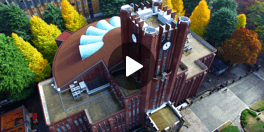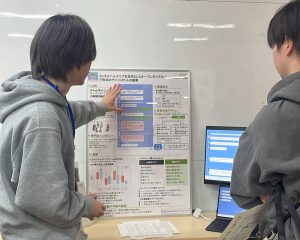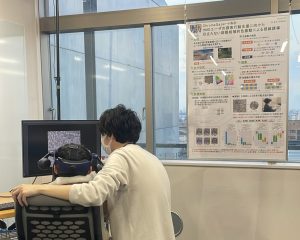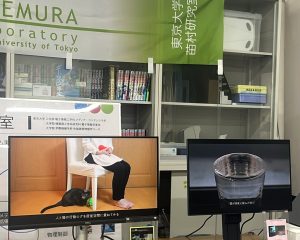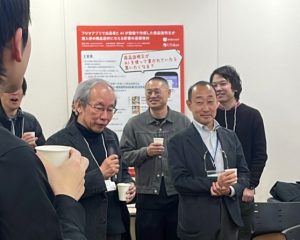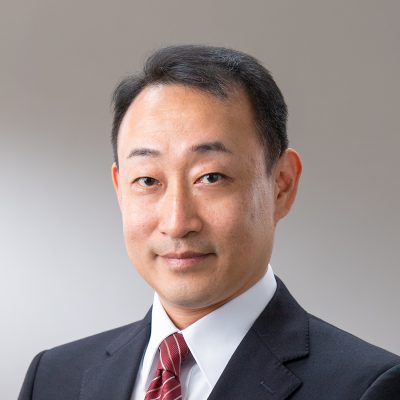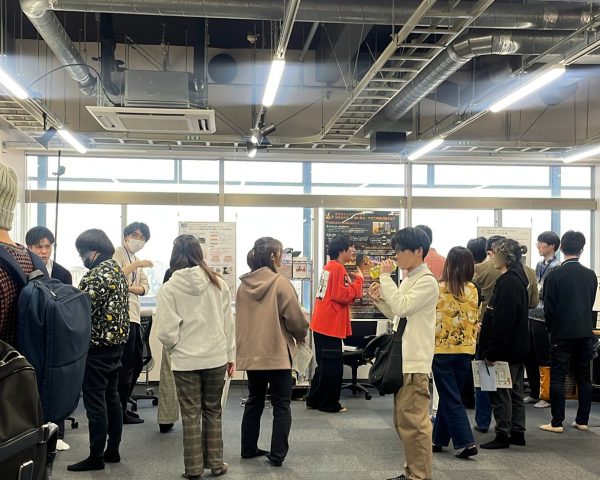
April 4, 2025
苗村研究室オープンハウス2025レポートReport on Naemura Laboratory Open House 2025
2025年2月28日、東京大学本郷キャンパス内の工学部2号館9階及び11階で、苗村研究室(以下、苗村研)による最新の研究成果を公開するオープンハウスが開催されました。このイベントでは、学生や教員が手掛けた23件のポスターとデモが3つの部屋で展示され、昨年に続き、オフラインで一般に公開される形式で行われました。
苗村研では、メディアとコンテンツに関わる実世界指向の研究活動に取り組まれています。物理制御(光学設計・回路実装)、情報処理(機械学習・信号処理)、対話設計(行動誘発・情動喚起)などの基盤技術研究に加え、これらの技術に基づき、複合現実感、画像認識、エンタテインメントコンピューティング、多人数調和型情報環境などへ展開する応用研究が行われています。
例えば、テキストコミュニケーションに関する研究においては、書体が信頼性・支配性の印象と意思決定に与える影響を調査する研究や、セルフ・コンパッション向上を目的としたチャットボット、メンタルヘルスケアを目的としたオープンダイアローグ形式のチャットボットの開発と評価など、ウェルビーイングを向上させる取り組みが紹介されていました。また苗村研究室オープンハウスの名物テーマとも言える空中像やロボットに関する研究も依然として盛況でした。鏡面の前後を往来可能かつ鏡像を伴う空中像の研究や、床・壁・天井の間を移行する群ロボットなどが展示されていました。
本年度のオープンハウスでは、大規模言語モデル(Large Language Model; LLM)関連技術を活用した研究の発表・展示が多かったことが特徴的でした。LLMを用いて研究論文を会話式ポッドキャストとして聞くことによる効果や行動解析、アイディエーションワークショップにおける批評的な議論を促すためにLLM同士を会話させる手法、LLMにより状況に応じてテキストチャットへの返答の見通しを返信する技術など、様々な分野にLLMを応用する研究が見受けられました。
こうした研究の他にも、東京大学本郷テックガレージや東京大学インクルーシブ工学連携研究機構(RIISE)の価値交換工学、中山未来ファクトリーでの活動紹介もポスターとして展開されていました。
昨年に引き続き現地開催されたオープンハウス。熱気に包まれた空間で、あちこちで盛んなディスカッションが繰り広げられている様子が印象的でした。また今年は、デモ・ポスター展示だけでなくコロナ禍前ぶりの懇親会も開催され、世代・立場を超えた交流が活発に行われていました。2025年度のオープンハウスも非常に楽しみです。
記事:伊藤寛子(東京大学工学部),沈瀾(神戸大学工学部)
(共に2025年4月より学際情報学府入学予定)
On February 28, 2025, Naemura Laboratory (hereafter referred to as “Naemura Lab”) held its annual Open House at the University of Tokyo’s Hongo Campus, utilizing the 9th and 11th floors of Engineering Building No. 2. Continuing the format from last year, the event took place entirely offline, showcasing 23 research posters and three demo presentations across three rooms.
Naemura Lab conducts real-world-oriented research in media and content. Its work spans foundational technical fields such as physical control (optical design, circuit implementation), information processing (machine learning, signal processing), and dialogue design (behavior induction, emotion elicitation). The lab also engages in applied research areas, including augmented reality, image recognition, entertainment computing, and multi-user harmonious information environments.
For example, in the realm of text communication, one project explores how font styles influence perceived reliability and dominance in decision-making. Another initiative involves developing and evaluating chatbots that promote self-compassion and mental health through open-dialogue formats. These projects aim to enhance users’ psychological well-being. The lab’s signature research on aerial images and robotics also drew attention, with exhibits demonstrating aerial images that can pass in front of and behind mirrors, as well as swarm robots capable of moving across floors, walls, and ceilings.
A notable feature of this year’s Open House was the prominent use of Large Language Models (LLMs). Presentations included experiments on listening to academic papers as conversational podcasts powered by LLMs, facilitating critical discussions in ideation workshops through LLM dialogues, and predicting conversational responses in text chats based on situational cues using LLMs across various domains.
In addition to these research presentations, posters introduced ongoing collaborations with Hongo Tech Garage and the Research Institute for Value Exchange Engineering (RIISE), part of the Inclusive Engineering Collaboration at the University of Tokyo. Activities at the Nakayama Future Factory were also featured.
As with last year, the Open House was held in a spirited atmosphere, filled with enthusiastic discussions. A new highlight this year was the addition of a social gathering reminiscent of pre-pandemic events, which encouraged active exchange across generations and roles. Expectations are already building for the 2026 edition of the Open House.
Text: Hiroko Ito (Faculty of Engineering, The University of Tokyo), Lan Shen (Faculty of Engineering, Kobe University)(Both authors are scheduled to enter the GSII in April 2025.)
English proofreading: David Buist (Project Senior Specialist)
主担当教員Associated Faculty Members
教授
苗村 健
- 先端表現情報学コース
- 情報学環教育部
Professor
NAEMURA, Takeshi
- Emerging design and informatics course
- Undergraduate research student program

